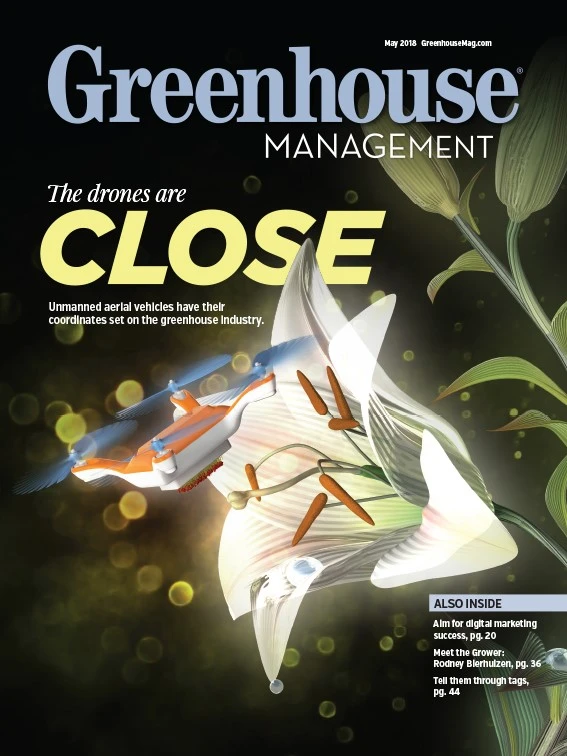
Steve Garvey, the head grower at Dallas Johnson Greenhouses in Council Bluffs, Iowa, has been working in greenhouses and with plants since he was a teenager. After attending college at South Dakota State University, he worked at an independent garden center for 15 years before being hired on at Dallas Johnson five years ago.
At Dallas Johnson, Garvey oversees nearly 75 acres of covered production space that ranges from hoophouses to recently constructed dual-atrium models, in which the company grows annuals, perennials, poinsettias and other crops. The business’s newest structures are outfitted with irrigation booms, ECHO hanging basket systems and other upgrades that make the growing process easier. According to Garvey, automating certain tasks was not a core part of the business when he started.
“What I bring to the business is that I love technology when it’s used properly,” he says.
Garvey’s interest in technology, and how it can help greenhouse businesses become more efficient, is part of the reason why he decided to pursue More Profitable Sustainability (MPS)-ABC certification for Dallas Johnson almost two years ago. The process was completed in May 2017. However, he says he was skeptical of the process at first.
“Growers [think that] they're going to come in and they're going to tell us how to spray and they’re going to tell us how to change our growing style,” Garvey says. “And I was in the same boat. [But the process] kind of changed my mind a little bit and I looked at it with an open mind to say, ‘Hey, I'm going to learn something from this.’”
MPS-ABC basics
MPS is a Dutch company that “develops and manages sustainability certificates for the international flowers and ornamentals industry,” according the company’s website. Globally, 3,000 growers in 46 countries participate in MPS-ABC including growers such as D.S. Cole Growers in Loudon, New Hampshire, and Metrolina Greenhouses in Huntersville, North Carolina.
To become certified, growers must closely monitor pesticide, fertilizer, energy and waste consumption data and have that data evaluated by MPS. At the end of the evaluation process, the organization will tell the growers how much they consume, how much they actually need to be using and how much is being wasted. In order to meet the Dutch government’s standards of sustainability procurement (shorthand for how sustainably a business purchases its different supplies), growers are also subject to inspections. Garvey says Dallas Johnson was inspected once a month over the course of the 13-month minimum evaluation period for MPS-ABC certification.
Most importantly, Garvey says the certification process helped Dallas Johnson in three ways. First, it gave them more information about the business’s sustainability — information they are working to use to market to younger consumers who not only want a nice plant, but one that was grown sustainably. Second, they found that certain chemicals were being overused and they have saved some money from the closer monitoring and application of those inputs. Lastly, because MPS is largely hands-off during the process, Garvey was able to develop a tracking system of his own to use.“There really is not a lot of communication with them unless you need it and they're always available, but I wanted to develop my own system for how we track here,” he says. “I have all the growers, as soon as they open a bag of fertilizer, check it off as used.”

What interested growers should know
When Garvey began looking into MPS-ABC certification, Garvey says he talked to other growers. He received a mixed bag of responses — some loved it and could not recommend it enough, others were more skeptical — and now is doing the same for growers who call his business.
“I tell them to just relax and it’s what you think it is,” he says. “They're not here to be the watchdogs or the guardians of the growing world. I'm looking at it as a tool to help you evolve as a grower. I don’t see how that’s not going to work.”
The biggest misconception, Garvey says, is the role MPS actually plays. While they do collect data, it is up to the participating growers to put in what they want to get out of it. MPS’ role in the process to collect the data, present it to you in the context of the business and other participating growers, and explain what it means.
“They say, ‘You’re efficient here’ or ‘You’re inefficient here,’” he says.
At Dallas Johnson, the certification process has been finalized, but Garvey says the business is still working to become more sustainable. After it received a ‘B’ certification — meaning the business scored somewhere between 55 and 66.9 points out of a possible 110 on its final inspection — he says he knows what needs to be done in order to get the business to an ‘A’ level. All it will take is some time.
“It's not an easy thing,” he says. “And if you're going to do it, do it right. And that's what we're trying to do. I don't care if it takes me five years to get there — as long as I get a little bit better every year, the job will get done.”

Explore the May 2018 Issue
Check out more from this issue and find your next story to read.
Latest from Greenhouse Management
- Growing enlightened
- American Floral Endowment awards 17 organizations $60,700 in educational grants
- Floral businesses invited to join Society of American Florists' Petal It Forward event in October
- Bioline AgroSciences acquires Viridaxis to strengthen leadership in aphids biocontrol
- Ryley Leech joins JumpLights as vice president of sales
- Meet the Retailers' Choice Awards from 2025 Farwest Show
- Added value
- National Garden Bureau announces featured crops for 2026 'Year of the' program






